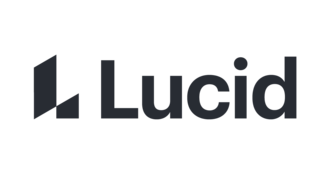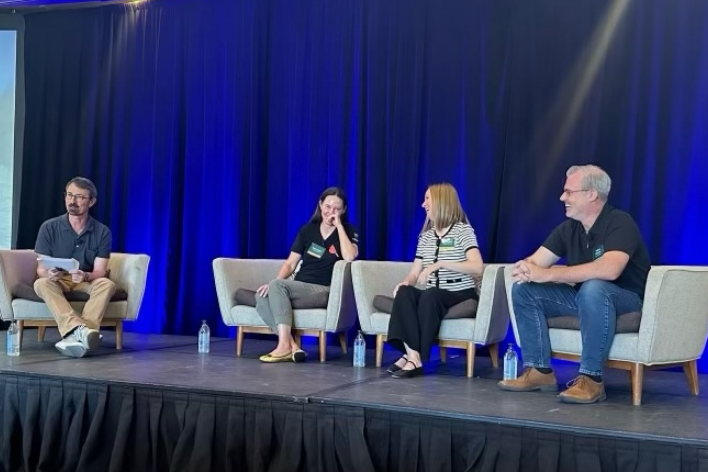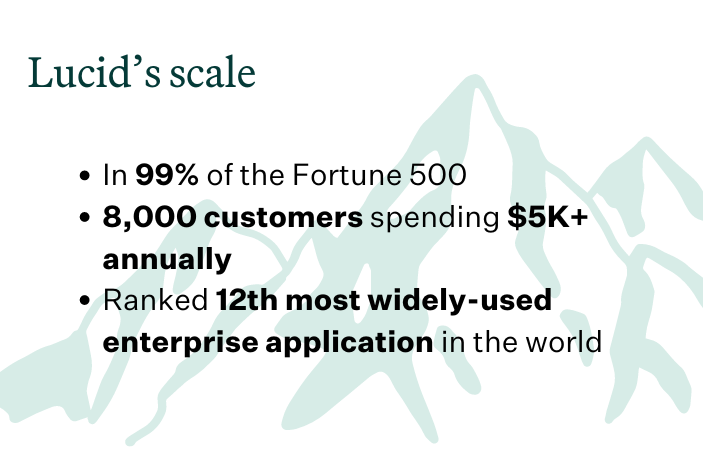
perspectives
Scaling Leadership with Lucid Software


"We built this company by being intentional—about our values, our people, and how we scale." – Kat Judd, Chief People Officer at Lucid
Lucid Software’s leadership team knows all about scale.
Founded in 2010 as a self-serve internet business with a big vision, the company is now a fully fledged enterprise software company, with users at 99% of Fortune 500 companies. The business has eight thousand enterprise customers spending more than $5K annually – including Google, Snowflake, Royal Bank of Canada, CapitalOne, Amazon, and T-Mobile. Lucid was recently ranked by Okta as the 12th most widely used enterprise application in the world.
At a recent panel for Spectrum portfolio leaders, three senior leaders from Lucid — Kat Judd (Chief People Officer and Associate General Counsel), Seamus Hennessey (Chief Financial Officer), and Cara Frisbie (General Counsel) — took the stage with Spectrum Managing Director, Ben Spero. They shared their strategies for guiding the company through its evolution.
1: Build for the company you’re growing into – not the company you are today
Kat joined Lucid in 2017, when the company had around 200 employees. Founder and then-CEO (now Board Chair) Karl Sun was committed to building an amazing team, and took personal responsibility for the caliber of their talent.
“He interviewed every single final candidate – including interns,” Kat remembered. Impressed by his dedication, she got to work, building processes to scale the people-centric culture.
“A lot of companies will ‘brute force it’ without establishing strong fundamentals at that size, but problems compound over time,” said Kat. “So about 18 months in, we decided to get smart about compensation philosophy.” She and her team started benchmarking jobs, conducting equal pay audits, and making corrections as needed.

Ben Spero, Cara Frisbie, Kat Judd, and Seamus Hennessey on stage at Spectrum's Leadership Summit.
Seamus Hennessey, who joined the company as CFO in 2021, has the same approach to foundational work. He learned this lesson the hard way at a previous company. After delaying a necessary ERP implementation, the business accelerated and an IPO process began earlier than expected. Seamus’ team was left scrambling to implement the tool while preparing their S1.
“Think about where you need to be one or two years out,” he advised the room of leaders. “And start getting it done now.”
2: When it comes to driving revenue, be the steering wheel – not the brakes
Lucid hired its first General Counsel, Cara Frisbie, less than a year after Kat – but Lucid had grown to 350 employees, partnered with Spectrum (in 2016), and was about to close another significant round of funding.
As Lucid’s first in-house counsel, Cara faced a familiar challenge for first key hires: how to layer in necessary processes without slowing the team down.
“In the Enterprise selling motion, your teams are deeply supporting core revenue generation,” noted Ben. “At Lucid’s size, you’re dealing with a big sales team, thousands of customers, and thousands of contracts any given quarter – how do you scale to support that Enterprise selling?”
“My team’s goal is to get deals done with the least friction possible,” Cara explained. She established aggressive SLAs for the commercial contract team, with the expectation that her team would always hit them. “We were fast and responsive to sales and the other teams supporting the revenue function – which built trust with those teams.”
But to hit those SLAs, Cara’s team had to be extremely efficient. They implemented workflows in Salesforce and Docusign, built extensive internal resources to make the legal team more efficient, and cross-trained additional members of the team on contracting to support busy periods. They also made their Salesforce workflows easier for rev ops teams to use, making those teams less reliant on legal support.
“And as simple as it sounds, we try to make our contracts and contract positions as balanced as possible to eliminate unnecessary back and forth,” said Cara.

As CFO, Seamus also found himself in the position to empower the sales team – or hold them back. Often his team needed to directly address billing challenges, or come up with creative solutions to customer concerns, to get the deal signed.
“Time kills deals,” said Seamus. “Help your sales team be creative when they run into deal roadblocks.”
Seamus’s philosophy is to build guard rails that allow teams to operate quickly, but continuously question and iterate. “If a new process or structure works, enable the team to implement it.”
“We’re always looking for new ways to be more efficient,” agreed Cara. Her team is currently trialing AI tools to help review customer form contracts. “The process never ends.”
3: Invest early in cross-team connection – and don’t let it fall off your list
Lucid is known for its exceptional employee culture (with the global and regional awards to back it up) – and it starts at the leadership level.
“I’ve known your team a long time,” said Ben, “And I’ve seen that you’re all extremely capable as individuals – but you also work together incredibly well. How do you stay connected and aligned through so much growth?”
Their first rule: constant communication. “This will sound very tactical, but the three of us have weekly touchpoints,” said Kat. “It can feel like a lot of frequency, but it also means each meeting is less intense.”
“We make time for each other,” agreed Cara. Along with one-on-ones, the entire executive team meets weekly, bolstered with longer sessions or offsites each month.
Secondly, the leaders foster tight alignment between their teams. “In the early days the three of us built strong partnerships, but today we can’t be in every meeting or part of every decision,” said Seamus. “We need our teams to feel that partnership too.”
Lastly, the cultural values that brought the three leaders to Lucid – and made them such good fits on the team – have continued to serve them.
“All of us have a strong solution-finding disposition,” said Kat. “We give each other the benefit of the doubt.”
“Teamwork over ego,” said Seamus, citing one of Lucid’s values – along with innovation, individual empowerment, and excellence. These values are part of Lucid’s interview process, internal awards, review process, and leadership training, keeping the company’s identity from diluting as it grows.
“We trust each other,” said Cara. “That makes all of the difference.”
This article was based on transcripts from the 2024 Spectrum Equity Leadership Summit, a biennial event where Finance, People, and Legal leaders from the portfolio come together to share insights, collaborate, and enjoy each other’s company. Learn more about our portfolio companies and their leadership teams here.